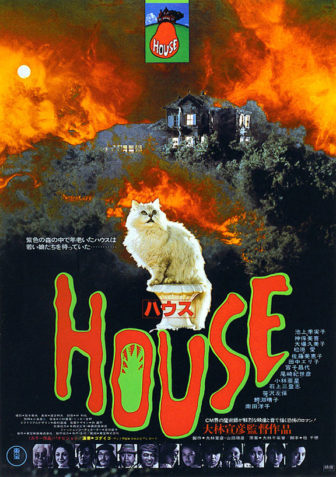 A far weirder than average haunted house movie from Japan. A heavily stylized film dealing with issues of sexuality and femininity, I don’t know that it’s all that good, but again, it’s definitely different.
A far weirder than average haunted house movie from Japan. A heavily stylized film dealing with issues of sexuality and femininity, I don’t know that it’s all that good, but again, it’s definitely different.
HOUSE’S director Nobuhiko Obayashi is quite a cult figure in his native Japan. This 1977 film (a.k.a. HAUSU) was his first, and he’s gone on to make at least a dozen more, including SUMMER WITH GHOSTS (1989) and DRIFTING CLASSROOM (1991), most of them dealing, as this film does, with the complexities of adolescence. So highly regarded is Obayashi that he’s widely referred to by a nickname, Obi, and has much of his work classified as “Ominichi,” the name of the resort town where “Obi” grew up, and where HOUSE and many other of his films were shot.
Oshare, a teenage girl, is unable to come to terms with the untimely death of her mother and her father’s new mistress. Together with several school friends Oshare decides to visit the secluded country house of a distant aunt.
Upon arriving, the girls find Oshare’s aunt, a seemingly kind, wheelchair bound, sterile old woman eagerly awaiting their arrival. The dark and creepy old house, for its part, reveals immediately that it has hallucinogenic powers: as soon as the girls set foot inside, they’re assailed by visions of falling chandelier pieces. More strange things happen…they find that a grand piano plays by itself and one of the girls hallucinates a severed head in a well nearby. By the time they figure out something’s up, it’s too late. One of the girls, playing the piano, gets her hands chopped off (which in turn continue to play!) and ends up, in one of the film’s most outrageous scenes, literally devoured by the instrument.
All Oshare’s friends get devoured in one way or another by the house, which seems to have taken on its owner’s pent-up sexuality (or something) and is all too eager to consume these nubile virgins.
By the end only Oshare is left alive. In refusing to surrender to the house’s spell she ends up becoming part of it, happily luring her father’s hated mistress into the fold.
To call this film bizarre would be an understatement. Obayashi’s ultra-stylized approach takes some getting used to; the whole thing is deliberately artificial and decked out with stylistic quirks (irises, superimpositions, etc.) that serve no apparent purpose. The tone is set by the opening credits, with the title “HOUSE” imprinting itself in lurid, cartoony style, and the O becoming a toothy mouth.
Accentuating the film’s feminine themes, the opening scenes are filmed and edited in histrionic, brightly lit romance movie stylization, complete with a sentimental theme that plays over and over…and, for that matter, continues even when the horror movie business kicks in. Once this happens, Obayashi utilizes “creative” intercutting (between one girl playing the piano and another staring into a mysteriously crumbing mirror), a musical number (involving the ancient aunt, a skeleton and a cat!) and much hallucinogenic animation. As the horror intensifies, the film descends increasingly into outright psychedelia until by the outrageous climax it seems closer to a late-60’s drug movie (such as THE TRIP or PSYCH-OUT) than a horror flick…much less a haunted house movie, surely the most traditional of all horror subgenres. Not here, though!
Vital Statistics
HAUSU (HOUSE)
Toho
Director: Nobuhiko Obayashi
Producer: Nobuhiko Obayashi
Screenplay: Nobuhiko Obayashi, Chiho Katsura
Cinematography: Yoshitaka Sakamoto
Editor: Nobuo Ogawa
Cast: Kimiko Ikegami, Kumiko Ohba, Yoko Minamida, Miki Jinbo, Mitsutoshi Ishigami, Aei Kobayashi, Ai Matsubara, Masayo Miyako
